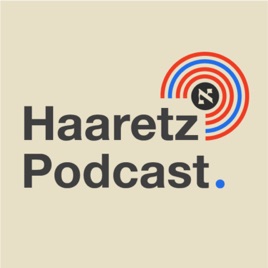
Advertise on podcast: Haaretz Podcast
Rating
4.2 from
Categories
Country
This podcast has
101 episodes
Language
Publisher
Explicit
No
Date created
2018/10/31
Average duration
40 min.
Release period
8 days
Description
From Haaretz – Israel's oldest daily newspaper – a weekly podcast in English on Israel, the Middle East and the Jewish World, hosted by Allison Kaplan Sommer.
Podcast episodes
Check latest episodes from Haaretz Podcast podcast
'Israelis are rejecting Netanyahu. That doesn't mean they are embracing left-wing views'
2024/02/21
You can hear the drumbeats for immediate elections in Israel in demonstrations in the streets, on highway billboards, and in the headlines. After four months of putting politics aside to focus on the war in Gaza and the northern border, Israelis - in growing numbers - are finally asking when they will be able to take their growing frustration with their current leaders to the polls.
Politics is also in the air when it comes to the Palestinian future - as the issue over who will rule Gaza and who will decide that - heats up. And as the 2024 November election looms in the United States, Israel and Gaza has become a hot potato in the race for the White House.
Public opinion expert and Haaretz columnist Dr. Dahlia Scheindlin joins host Allison Kaplan Sommer on this week's Haaretz Podcast to analyze the political map in each of these arenas in detail.
Scheindlin warns against misinterpreting the consistent polls showing that Israelis are ready to rid themselves of Benjamin Netanyahu following October 7 as evidence that they oppose his wartime policies, as well as the reason for why how Hamas appears to be far more politically popular in the West Bank than they are in Gaza.
See omnystudio.com/listener for privacy information.
more
'This is not our first war, but it's the first war we've seen Israel's credit rating drop'
2024/02/14
The decision by Moody's credit rating agency to downgrade Israel's rating and outlook last week was a shock to the country after decades of growth and a rosy outlook for the future as its technology-driven industries flourished.
Haaretz economics editor and commentator David Rosenberg explains to Haaretz Podcast host Allison Kaplan Sommer why Israel received this "black mark," what it means, Israel's finance minister's "abnormal reaction" to the news and how it reflects the world's distrust of a far-right Orthodox-dominated government with an "agenda that, whatever else you might think about it, is not positive for the start-up nation phenomenon."
The Gaza war, he suggests, marks the end of "a view that was shared by many people in the Middle East – not just by Israelis – that there was an alternative to war and terrorism and constant political upheaval. That alternative, which we've seen happening in the Gulf, especially in the United Arab Emirates, and to a degree in Saudi Arabia, was 'let's focus on economic development and creating normal middle class societies' while pushing the Palestinian problem and try to put our political troubles behind us."
Also on the podcast, Haaretz's Washington correspondent Ben Samuels outlines the growing tensions between the Biden White House and the Israeli government over a full-on ground invasion in Rafah, where Hamas military presence remains, among 1.3 million Palestinian refugees crammed into the southern Strip.
Will Netanyahu defy the Biden administration's concerns and forge ahead? Samuels says that as long as the White House offers carrots without sticks, he believes it will. "The warnings are falling on deaf ears because Israel understands that there aren't going to be significant consequences other than rhetorical reprimands. Until there's really some sort of conditionality on U.S. support, the warnings of the administration will be relatively ineffective."
See omnystudio.com/listener for privacy information.
more
Israel's former head of military intelligence: 'If we don't offer an alternative, we'll end up with Hamas again'
2024/02/05
Israel's former head of military intelligence, Tamir Hayman, now the managing director of the Institute for National Security Studies, joins host Allison Kaplan Sommer on Haaretz Podcast to discuss Israel's war with Hamas and the key question: How far is Israel willing to go to bring 130-plus hostages home?
While Hayman believes that the terms of a ceasefire are negotiable on both sides, he is skeptical that Israel's current government would release the political prisoners with blood on their hands that Hamas will demand in exchange. Therefore, "a large-scale hostage deal is not in the cards."
Israeli political considerations, he adds, also stand in the way of what he believes is Israel's best chance: embracing the Biden administration's "American Initiative for Regional Change" which packages a ceasefire in Gaza, acceptance of the Palestinian Authority as a central civilian authority there, and Saudi normalization and regional integration.
"It comes down to this: What is more important – the survival of the prime minister in the current government, or… whether from the atrocities of the 7th of October, the lowest point in our history, we can achieve something grand, something that will create a new horizon," Hayman asserts, stressing that Israel has the most to lose by continuing to avoid the question of what will happen in Gaza "the day after" the war.
"If you don't give an alternative... for the population, eventually you will have chaos, and you will end up with Hamas rule," he says.
Four months after October 7, Hayman says that the question of the failures that led to the surprise attack continue to occupy him. "There is no night that I go to sleep and I don't think about my time as head of intelligence and ask myself whether I was wrong in my assumptions regarding Hamas."
See omnystudio.com/listener for privacy information.
more
Rallying for democracy, calling to free hostages: Where Israel's protest movements stand
2024/01/29
Thousands of Israelis are back on the streets, four months after the October 7 Hamas attack and the war in Gaza halted historic demonstrations against the Netanyahu government's plan to overhaul the judiciary.
Joining host Allison Kaplan Sommer on the Haaretz Podcast, reporter Linda Dayan explains how the protest movement has reemerged, and how wartime demonstrations differ.
While the current wave of protests began with vigils and rallies for the hostages' return, "as the objectives of the war got a little bit muddier [and] military casualties started to mount, we started to see that the hostages weren't coming back and that we didn't have a deal on the table to bring them back – we started to get more political anti-government protests demanding 'elections now,'" Dayan says.
These two movements – one for bringing the hostages home and the other consisting of anti-government action – "are being held concurrently in two separate locations in Tel Aviv."
Along with Dayan, Moran Zer Katzenstein, leader of Bonot Alternativa, the women's rights organization whose Handmaid's Tale-inspired costumes became a symbol of the pro-democracy protests last year, explains why her group has returned to the streets despite calls for unity in wartime.
See omnystudio.com/listener for privacy information.
more
The ugly price Israel will pay for the decision-making failures that led to October 7
2024/01/22
On this week's Haaretz Podcast, host Allison Kaplan Sommer holds a wide-ranging conversation with Chuck Freilich, Israel's former deputy national security adviser.
Freilich, a senior researcher at the Institute for National Security Studies, discusses the numerous troubling issues arising from Israel's conflict with Hamas. He says that in the "hot atmosphere" following October 7, Prime Minister Benjamin Netanyahu's government set problematic goals when it declared its intention to destroy Hamas as a military organization and topple it from being the governing body in Gaza.
A deal to bring the hostages back, says Freilich, "will mean thousands of Hamas terrorists being released. And we know that a lot of them will go back and conduct terrorist operations in the future... but this is the price one pays for the decision-making failures that led to October 7. It's ugly."
The deterioration in the relationship between Biden, "a remarkable friend to Israel" and Netanyahu, and the loss of U.S. support, is what he fears may ultimately be the most dangerous consequence of this war.
"I think our relationship with the United States is an existential one," he says, " and the war with Hamas shows we are far more dependent on the U.S. than we ever knew."
See omnystudio.com/listener for privacy information.
more
'Can Netanyahu be ousted?' and other burning questions from Haaretz readers
2024/01/16
In a special edition of the Haaretz Podcast, host Allison Kaplan Sommer and the Haaretz editorial team asked subscribers worldwide what they saw as the most urgent questions as the Israel-Hamas conflict passed the 100-day mark. The questions poured in.
Is there any way to get rid of Netanyahu? What do Israelis know - and think about the level of death and destruction in Gaza? How does Israel decide when to assassinate a Hamas leader? Should Israel be more worried about progressive Democrats or the possible election of Donald Trump and the rise of the far-right? What will the future look like for Israel and Gaza once this conflict is over? Should Israel go out of its way to protect diaspora Jews?
Listen to the answers given by Haaretz editor in chief Aluf Ben, Haaretz English editor in chief Esther Solomon, Haaretz analysts Anshel Pfeffer, Yossi Melman, Alon Pinkas and Dahlia Scheindlin, and Haaretz correspondents Sheren Falah Saab and Ben Samuels.
See omnystudio.com/listener for privacy information.
more
'How can we expect others to empathize with us when we fail to empathize with Palestinians?'
2024/01/09
Rabbi Sharon Brous, founder of the IKAR synagogue in Los Angeles, has been progressive Judaism's leading voice over the past decade speaking out for equality and human rights, as well as the rabbinic figure of choice for the Biden-Harris White House.
Author of the new book "The Amen Effect: Ancient Wisdom to Mend Our Broken Hearts and World," Brous told Haaretz Podcast host Allison Kaplan Sommer that her world changed since October 7 and that, among other realizations, she reached the "painful awareness" that some of her allies on the left still "don't see Jews in that utopian anti-racist society that we have been dreaming about together."
Brous, whose new book focuses on Jewish mourning rituals, said it is understandable that even Jews on the progressive left are currently enmeshed in tribal grief as the war rages on. Her own congregation in Los Angeles includes families of those murdered and kidnapped by Hamas.
Still, she said, "Each of us, in our own way, has to find when we're ready to step out of our shiva, and see that there is a world of human suffering that is happening just over the border."
See omnystudio.com/listener for privacy information.
more
Dennis Ross: On Gaza, 'Netanyahu's far-right ministers aren't living in reality'
2024/01/01
Ambassador Dennis Ross has played an important part in U.S. Middle East policy over the last decades, and was the point man in the peace process in both the George W. Bush administration and Bill Clinton's administration. On Saturday night, he made a speech on the stage of the weekly Tel Aviv rally in solidarity with Israeli hostages still held by Hamas, making the case for a more long-term vision in the fight to dismantle Hamas and shape the future of Gaza.
In this week's Haaretz podcast, Ross spoke to host Allison Kaplan Sommer about the impact of October 7 on Israelis and Palestinians, on the things that have shaken him most on his current visit to the region and what has to be done to move forward after the horrors of the Gaza war.
See omnystudio.com/listener for privacy information.
more
'Death in Gaza is a taboo subject in Israel right now'
2023/12/26
As the number of Palestinian deaths in Gaza climbs to 20,000 while the number of Israeli soldiers killed in fighting grows daily, it is becoming harder every day for the two sides of the bloody conflict to see the humanity in the other side, says Sheren Falah Saab, who is covering the Gazan side of the conflict for Haaretz.
Falah Saab tells Haaretz Weekly host Allison Kaplan Sommer about the difficulty of covering a war when you can't be on the ground and the individual human stories among the thousands of Gazan victims of the war she has chosen to bring the world through her journalism.
"In the end, they are human beings and Hamas didn't ask Gazans if they wanted to go to war or not," Falah Saab says, as she discusses the challenges of being an Arab citizen of Israel writing in Hebrew to Israeli readers at a time when speaking of death in Gaza "is taboo." She has personally lost friends on both sides of the conflict.
See omnystudio.com/listener for privacy information.
more
‘The Houthis don’t care about the Palestinians. They are attacking Israel to gain support’
2023/12/18
The Houthis in Yemen, the Islamist rebel group that has shot missiles and drones at Israel and is now intensifying attacks on key shipping lanes in the Red Sea, have progressed from being "a nuisance and a headache to a major strategic threat to Israel," according to Dr. Yoel Guzansky, a former member of Israel's National Security Council and a senior researcher at the Institute for National Security Studies.
Their escalating attacks on international shipping over the course of the Israel-Hamas conflict have raised the stakes of Israel's conflict with its neighbors into a global concern. On Monday, the U.S. announced the formation of a coalition of ten nations to take action against the Houthi aggression against cargo ships which threatens global trade.
On the Haaretz Weekly podcast, Guzansky, and Haaretz National Security editor Avi Scharf, sit down with host Allison Kaplan Sommer to discuss who the Houthis are and how Israel - and the world - should respond to them.
See omnystudio.com/listener for privacy information.
more
'Israelis don't see images from Gaza because our journalists are not doing their job'
2023/12/12
From the horrifying live videos broadcasted by Hamas militants on the morning of October 7 during their invasion of Israeli villages, to IDF soldiers entering Gaza, the bombarded buildings, and the long lines of refugees with few belongings – The Israel-Hamas war is probably the most continuously, visually, documented war in history.
Pictures have great power. And that means those in power have a great interest in directing images towards their political narrative. On this episode of the Haaretz Weekly podcast, Israeli journalist and activist Anat Saragusti, who has lived and reported from both southern Israel and the Gaza Strip, and is recognized as Israel's first woman war photographer, talks to Esther Solomon about the striking visuals we have been exposed to since the October 7 massacre, and the one's that are missing in Israeli media.
Saragusti is currently the curator of an exhibition called 'Local Testimony': a collection of the iconic photographs from the past year in Israel.
In the conversation, Saragusti also addresses the fact that Israeli mainstream media barely shows images of what's happening in Gaza and isn't regularly reporting on the dire situation in the Strip. "The fact that Israeli audiences don't see images from Gaza means that journalists are not doing their jobs," she states matter-of-factly. "They have to show the images. Hebrew speaking Israelis watching television news are not exposed at all to what's going on in Gaza. We don't see the atrocities, the rubble, the destruction and the humanitarian crisis. The world sees something completely different."
See omnystudio.com/listener for privacy information.
more
Is the Red Cross failing Israeli hostages held by Hamas?
2023/12/05
In this week's episode of the Haaretz Weekly podcast, Haaretz English editor-in-chief Esther Solomon explores a topic that has angered the Israeli public since the start of the Israel-Hamas War: Why haven't representatives of the Red Cross been able to visit Israeli hostages who are being held in Gaza in unknown locations and conditions for almost two months?
As some captives were released by Hamas during a temporary cease-fire, Israelis – who were closely watching the daily releases on television - have started to see the Red Cross's representatives as taxi drivers, who can do nothing more than drive the hostages to the border.
Yael Friedson, Haaretz’s legal correspondent, has been reporting on the plight of the hostages held by Hamas. She says, “Everyone hopes that the Red Cross representatives could visit the hostages and pass on medicine and messages from the families,” but, she notes, there is a knowledge gap about what a neutral humanitarian organization can actually do without the consent of both parties.
Sarah Elizabeth Davies, ICRC spokesperson based in Jerusalem, explains that the anger directed at the organization is misdirected. “We cannot force our way in, we don't have weapons, and we don't have political power. We stay neutral, so that we can be trusted. And this is not something that is always easily understood, particularly in the emotional reality of a conflict.”
Jonathan Adiri, former IDF chief liaison officer to the Red Cross, tells Haaretz that Israel’s relationship with the Red Cross “has had its ups and downs”, but stresses: “Their neutrality is critical. The fact that there’s an organization with enough carrying capacity to receive our hostages [from Hamas] and bring them to safety is not to be taken lightly.”
See omnystudio.com/listener for privacy information.
more
Podcast reviews
Read Haaretz Podcast podcast reviews
farmforager
2024/01/15
Excellent content poor sound
Though the topics and commentary is excellent, the producers should try to improve the sound quality which ranges from mediocre to very poor. (you nee...
more
Professor R. Hinkley
2024/01/26
Alison is great
Alison Kaplan Sommer is great.
I don’t always agree with the politics here—but I nonetheless find the perspective fulfilling to listen to because I l...
more
Leonickx
2022/06/22
Great-ish
Great window into Israel politics and society by Haaretz’s smart, articulate and well-informed writers.
I like their liberal left of center standpoi...
more
Flushing Guy (queens)
2024/01/02
Sound terrible
Barely audible. Why bother. And Amos Harel cheerleading not worthwhile. Nothing about catastrophic failure of intelligence and utter lack of IDF plan...
more
oldsoccermom
2023/12/17
Disappointed
I sought a thoughtful Israeli perspective at the beginning of the war and found it here. But in the midst of an unprecedented killing of civilians the...
more
snksnenwjwkwkwiwidnd
2023/12/09
As good as it gets
I started listening to Haaretz to get an insight into what is being discussed inside Israel but the narcissism of israeli media is astounding. There i...
more
Real-time dude
2023/10/15
Trash
Don’t bother many better podcasts out there
Dr. Zion
2022/12/29
Dr. Yofi Tirosh
Dr. Yofi Tirosh is an eloquent spokesperson for women’s rights in Israel. She effectively advocates for left-wing liberal democratic values in Israeli...
more
jdjdms
2022/11/03
This latest epidemic
Has a trippy title!
joey bag of dounuts
2022/10/26
Libs patting themselves on their backs .
I listened as these brilliant donkeys, complained about Israel refusing to give their Iron dome technology to the Ukraine… The UKRAINE who has just jo...
more
Podcast sponsorship advertising
Start advertising on Haaretz Podcast & sponsor relevant audience podcasts
You may also like these news Podcasts

3.6
352
535
The TMZ Podcast
TMZ

4.8
275
215
Coin Stories with Natalie Brunell
Natalie Brunell

4.4
601
105
Software Engineering Daily
Software Engineering Daily

0
0
118
Rugby Direct
Newstalk ZB

4.8
27961
1695
The Michael Knowles Show
The Daily Wire

4.6
3005
2000
Armstrong & Getty On Demand
iHeartPodcasts

4.9
6259
528
The Victor Davis Hanson Show
Victor Davis Hanson and Jack Fowler

4.7
895
1733
Techmeme Ride Home
Ride Home Media

4.5
1273
744
Odd Lots
Bloomberg

4.8
878
449
Ride the Lightning: Tesla Motors Unofficial Podcast
Ryan McCaffrey



